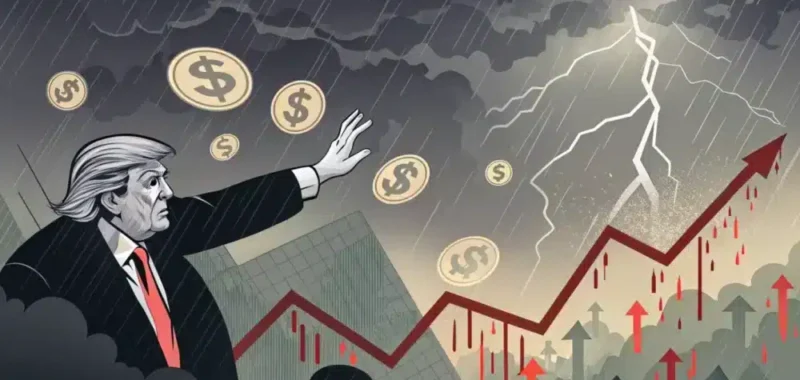- Trump’s tariff announcement triggered significant losses in U.S. crypto stocks and ETFs.
- Despite the downturn, BlackRock’s IBIT saw net inflows, highlighting crypto resilience.
The crypto market experienced a sharp downturn on 3rd April following former President Donald Trump’s announcement of sweeping new tariffs, which heightened global trade tensions and rattled investor confidence.
Trump’s tariff shock
Major U.S. crypto stocks were among the hardest hit, with Coinbase Global (COIN.O) falling by 7.7% and other key players like MicroStrategy (MSTR.O) dropping by 5.6%.
The mining sector also felt the impact, with MARA Holdings (MARA.O), Riot Platforms (RIOT.O), and Bitfarms each seeing declines of 8.3%, 8.7%, and 5%, respectively.
By press time, the downward trend continued, with Coinbase down 6.6%, MicroStrategy down 9.68%, and Riot down 8.98%, reflecting the broader unease in the market.
Crypto stocks, ETFs are no exception
The impact of President Trump’s tariff announcement rippled across the crypto markets, with significant outflows recorded in U.S. spot bitcoin exchange-traded funds (ETFs).
On 3rd April, U.S. spot bitcoin ETFs saw $99.86 million in net outflows, reversing the previous day’s $220.76 million inflow as per SoSoValue data.
Grayscale’s GBTC led the outflows with $60.2 million, followed by Bitwise BITB and Fidelity FBTC, with outflows of $44.19 million and $23.27 million, respectively.
Despite the downturn, BlackRock’s IBIT, the largest spot bitcoin ETF by net assets, stood out by attracting $65.25 million in net inflows, highlighting its resilience amid market volatility.
Whereas, Bitcoin [BTC], the largest cryptocurrency, fell by 3.9%, and Ethereum [ETH] dropped 5.2% as investor sentiment soured.
Here’s how the community reacted
Marcin Kazmierczak, COO of blockchain firm RedStone, noted that the declines highlight an increasing link between digital assets and macroeconomic policy changes and added,
“But protectionist policies that potentially weaken dollar hegemony could accelerate interest in decentralized alternatives over the medium-to-long term.”
Crypto investment specialist David Hernandez from 21Shares further pointed out that the impact on the crypto market was less severe compared to other industries.
“The price action highlights crypto’s hyper-democratic and borderless nature, allowing investors worldwide to hedge against the potential impact of macroeconomic uncertainties.”
However, despite the turbulence, the crypto market is showing signs of resilience amid global economic shifts and regulatory developments.

